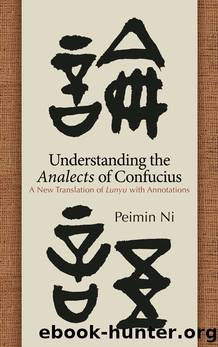Understanding the Analects of Confucius by Peimin Ni

Author:Peimin Ni
Language: eng
Format: epub
Publisher: State University of New York Press
Published: 2017-07-14T16:00:00+00:00
子罕第九 Book 9
9.1子罕言利,与命,与仁。
The Master rarely (han 罕) spoke (yan 言) about profit (li 利). He would rather leave it to (yu 与) destiny (ming 命) and to (yu 与) human-heartedness (ren 仁).
This is a particularly difficult passage because several words in it allow multiple readings. The word yu 与 in this passage can mean either “and” or “is in favor of being with,” or “leave it to.” Taking it as “and,” the passage becomes “The Master rarely spoke about profit, destiny, and human-heartedness.” This reading leads to the puzzle that actually the Master spoke not infrequently about the subjects, especially about human-heartedness. Many have tried to explain this puzzle away. HE Yan, for instance, believes that “spoke about” means “grant the title of,” the word li 利 should be read as “benefiting,” and the word ming 命 should be read as an abbreviation for tianming 天命, mandate of heaven. So it becomes “The Master rarely granted someone with the title of being widely benefiting, of being in accord with the mandate of heaven, and of being human-hearted” (cf. 6.30, 7.34). An alternative explanation is to take han 罕 as xuan 轩—openness, and thus the passage becomes “The Master openly expressed his views on” all these three subjects!
Taking yu as “is in favor of being with” would normally generate a reading like “The Master rarely spoke about profit. His favorite topics are about destiny (or mandate of heaven) and human-heartedness.”
While the reader should be aware of these controversies and make one’s own judgment, the reason for my translation is mainly based on the fact that this is more consistent with the Master’s overall teachings, as revealed in passages like 4.5, 4.16, 7.12, 7.16, 12.4, 12.5, and 14.12.14
9.2达巷党人曰,「大哉孔子,博学而无所成名。」子闻之,谓门弟子曰,「吾何执?执御乎,执射乎?吾执御矣。」
A man of the village of Daxiang said, “Great indeed is Confucius! His learning is extensive, yet he has not made a name for himself for anything.” Upon hearing this, the Master said to his disciples, “What should I specialize in? Charioteering? Or archery? I will take charioteering.”
ZHENG Xuan and WANG Bi 王弼 (226–249) take the man from Daxiang to be praising Confucius that his greatness transcends ordinary names, and they take Confucius’ response to be due to his modesty (see CHENG Shude 570). It seems more natural, however, to take it as sarcasm that tries to ridicule the Master—if he has not made a name for himself for anything, what greatness does he have? Responding to sarcasm with a sense of humor, the Master did not brag about his great ambitions, nor did he defend himself for the various arts that he was capable of. Yet the unspoken message is exactly that he would not be so great if he were merely specialized in something. As Confucius says elsewhere, “An exemplary person is not a mere vessel” (2.12). Learning the arts such as archery and charioteering is also for transformation of the person and not merely for attaining special skills.
9.3子曰:「麻冕,礼也。今也纯,俭,吾从众。拜下,礼也。今拜乎上,泰也,虽违众,吾从下。」
The Master said, “The use of a linen cap was prescribed by the rituals, but now a silk one is used instead.
Download
This site does not store any files on its server. We only index and link to content provided by other sites. Please contact the content providers to delete copyright contents if any and email us, we'll remove relevant links or contents immediately.
| Confucianism | Feng Shui |
| I Ching | Jainism |
| Karma | Shintoism |
| Sikhism | Tao Te Ching |
| Taoism | Tibetan Book of the Dead |
| Zoroastrianism |
The Tao of Physics by Fritjof Capra(1866)
The Diamond Cutter by Geshe Michael Roach(1679)
Feng Shui by Stephen Skinner(1623)
Human Design by Chetan Parkyn(1587)
The Alchemy of Sexual Energy by Mantak Chia(1499)
Tao Te Ching by Lao Tzu(1493)
365 Tao: Daily Meditations by Ming-Dao Deng(1309)
Tao Tantric Arts for Women by Minke de Vos(1270)
Sun Tzu's The Art of War by Giles Lionel Minford John Tzu Sun(1253)
Karma-Yoga and Bhakti-Yoga by Swami Vivekananda(1239)
Sidney Sheldon (1982) Master Of The Game by Sidney Sheldon(1198)
Buddhism 101 by Arnie Kozak(1192)
The Analects of Confucius by Burton Watson(1154)
The Art of War Other Classics of Eastern Philosophy by Sun Tzu Lao-Tzu Confucius Mencius(1148)
The New Bohemians Handbook by Justina Blakeney(1109)
Tao te ching by Lao Tzu(1084)
The Way of Chuang Tzu by Thomas Merton(1080)
The Sayings Of by Confucius(1034)
Bless This House by Donna Henes(996)
